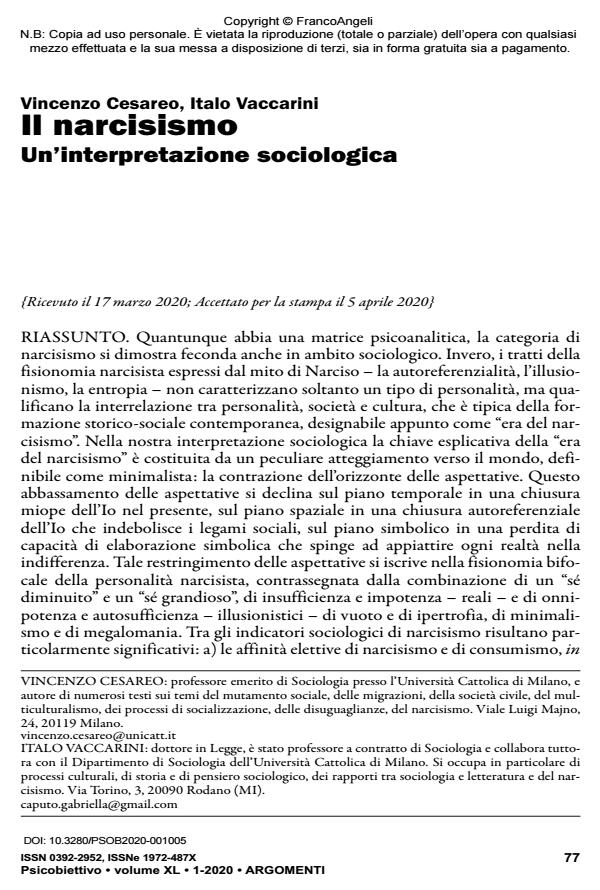Narcissism. a sociological interpretation
Journal title PSICOBIETTIVO
Author/s Vincenzo Cesareo, Italo Vaccarini
Publishing Year 2020 Issue 2020/1
Language Italian Pages 27 P. 77-103 File size 215 KB
DOI 10.3280/PSOB2020-001005
DOI is like a bar code for intellectual property: to have more infomation
click here
Below, you can see the article first page
If you want to buy this article in PDF format, you can do it, following the instructions to buy download credits

FrancoAngeli is member of Publishers International Linking Association, Inc (PILA), a not-for-profit association which run the CrossRef service enabling links to and from online scholarly content.
Despite its psychoanalytic matrix, the category of Narcissism proves to be fruitful also in the sociological field. Indeed, the traits of the narcissistic physiognomy expressed by the myth of Narcissus - self-referentiality, illusionism, entropy - not only characterize a type of personality, but also qualify the interrelation between personality, society and culture, which is typical of that contemporary historical-social dimension described as "the era of Narcissism". In our sociological interpretation, the key to understanding the "Era of Narcissism" lies in a peculiar attitude towards the world, defined as minimalist: the contraction of the horizon of expectations. This lowering of expectations results in a short-sighted closure of the ego inside the present; on a spatial level results in a self-referential closure of the ego, which causes the weakening of social bonds; on the symbolic level it translates in the loss of the ability to interpret symbols, thus making the differences of each reality vanish into indifference. The narrowing of expectations is part of the bifocal physiognomy of the narcissistic personality, marked by the combination of a "diminished self" and a "grandiose self", of - actual - insufficiency and impotence and of - illusionistic - omnipotence and self-sufficiency, of emptiness and hypertrophy, of minimalism and megalomania. Among the sociological indicators of Narcissism, the following are particularly significant: a) the elective affinities between Narcissism and Consumerism, especially regarding the concept of freedom as the absence of constraints; b) the erosion of social bonds, starting from primary bonds with parental figures - starting with the father to reach the crisis of association inside civil society and in mass parties, in the context of political society; c) the affirmation of a postmodern culture and worldview, which undermine the core values of modernity - work, politics, science - trivialize culture in the name of relativism and reduce the interest for existential questions.
Keywords: Expectations (dilatation versus contraction of expectations); consumerism; depression; social bond; minimalism; narcissism; postmodernism; diminished self; grandiose self.
- AA.VV. (2011) Inverno demografico, Laterza, Roma-Bari
- Acquaviva S. (1990) Eros, morte ed esperienza religiosa, Laterza, Roma-Bari
- Agostino da Ippona (1968) Le confessioni, Zanichelli, Bologna
- Barber B. (2010) Consumati. Da cittadini a clienti, Einaudi, Torino
- Baudrillard J. (1984) Le strategie fatali, Feltrinelli, Milano
- Baudrillard J. (2010) La società dei consumi. I suoi miti e le sue strutture, Il Mulino, Bologna
- Bauman Z. (2010) Consumo, dunque sono, Laterza, Roma-Bari
- Benasayag M., Schmit G. (2014) L’epoca delle passioni tristi, la Feltrinelli, Milano
- Blankenhorn D. (1995) Fatherless America, Harper Collins, New York
- Bloom A. (2009) La chiusura della mente americana. I misfatti dell’istruzione contemporanea, Lindau, Torino
- Cassese S. (2002) La crisi dello stato, Laterza, Roma-Bari
- Cesareo V., Vaccarini I. (2012) L’era del narcisismo, FrancoAngeli, Milano
- Codeluppi V. (2003) Il potere del consumo, Bollati Boringhieri, Torino
- Crouch C. (2001) Postdemocrazia, Laterza, Roma-Bari
- Dahrendorf R. (2001) Dopo la democrazia, Laterza, Roma-Bari
- Ehrenberg A. (1999) La fatica di essere se stessi, Einaudi, Torino
- Erikson E. (1974) Gioventù e crisi di identità, Armando, Roma
- Featherstone M. (1996) Cultura globale. Nazionalismo, globalizzazione e modernità, SEAM, Roma
- Fforde M. (2005) Desocializzazione. La crisi della postmodernità, Cantagalli, Siena
- Ferrarotti F. (1995) Homo sentiens, Liguori, Napoli
- Finkielkraut A. (2013) L’identité malhereux, Stock, Paris
- Furedi F. (2005) Il nuovo conformismo. Troppa psicologia nella vita quotidiana, Feltrinelli, Milano
- Furedi F. (2007) Che fine hanno fatto gli intellettuali?, Raffaello Cortina, Milano
- Furedi F. (2012) Fatica sprecata. Perché la scuola oggi non funziona, Vita e Pensiero, Milano
- Hassan I. (1971) Postface a The Dismemberment of Orpheus: Towards a Postmodern Literature, Oxford University Press, Oxford
- Jameson J. (1989) Il postmodernismo. La logica culturale del tardo capitalismo, Garzanti, Milano
- Laqueur W. (2007) The Last Days of Europe, St. Martin Press, New York
- Lasch C. (1981) La cultura del narcisismo, Bompiani, Milano
- Lasch C. (1985) L’io minimo. La mentalità della sopravvivenza in un’epoca di turbamenti, Feltrinelli, Milano
- Lyotard J.F. (1979) La condizione postmoderna, Feltrinelli, Milano
- Luckmann T. (1976) La religione invisibile, Il Mulino, Bologna
- Maffesoli M. (2005) Note sulla postmodernità, la Feltrinelli, Milano
- Mitscherlich A. (1970) Verso una società senza padre, Feltrinelli, Milano
- Murray C. (2012) Coming Apart: The State of White America, 1960-2010, Crown Publishing Group, New York
- Nussbaum M. (2010) Not for Profit, Princeton University Press, Princeton
- Pulcini E. (2001) L’individuo senza passioni. Individualismo moderno e perdita del legame sociale, Bollati Boringhieri, Torino
- Putnam R. (2004) Capitale sociale e individualismo, Il Mulino, Bologna
- Recalcati M. (2011) Cosa resta del padre? La paternità nell’epoca postmoderna, Raffaello Cortina, Milano
- Risé C. (2003) Il padre, l’assente inaccettabile, San Paolo, Cinisello Balsamo
- Ruini C. (2011) Il cambiamento demografico, Laterza, Roma-Bari
- Sennett R. (2006) Il declino dell’uomo pubblico, Mondadori, Milano
- Sennett R. (2012) Insieme. Rituali, piaceri, politiche della collaborazione, Feltrinelli, Milano
- Simmel G. (1950) The Sociology of Georg Simmel, in Wolff K. (a cura di), The Free Press, Glencoe
- Taylor C. (1993) Radici dell’Io. La costruzione dell’identità moderna, Feltrinelli, Milano
- Twenge J. (2007) Generation Me, Free Press, Excelsior, Milano
Vincenzo Cesareo, Italo Vaccarini, Il narcisismo. Un’interpretazione sociologica in "PSICOBIETTIVO" 1/2020, pp 77-103, DOI: 10.3280/PSOB2020-001005